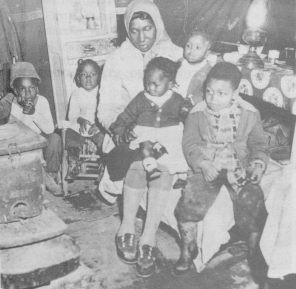Two years prior to John and Viola McFerren and C. P. Boyd leading the Negro voter registration drives in two of Tennessee's southwestern counties, on September 9, 1957, the Eighty-fifth United States Congress enacted the first civil rights bill since 1875. This civil rights legislation, among other things, empowered the U. S. government to initiate civil suits in federal courts where any individual or group was prohibited from or threatened for exercising their right to vote.
In 1959, blacks in Fayette and Haywood counties fought for the right to vote. The McFerrens of Fayette County and C. P. Boyd of Haywood County shared the same concern about the constitution. This concern was ignited by the absence of Negro jurors for the Burton Dodson trial. Dodson, an African-American farmer in his seventies was on trial for the alleged 1941 murder of a white man. Because African Americans were intrinsically denied their rights to participate in the electoral process, they were omitted from the pool of potential jurors. John McFerren and others from Fayette County formed the Original Fayette County Civic and Welfare League, Inc., and C. P. Boyd and others formed the Haywood County Civic and Welfare League. One of the primary objectives of both leagues was to initiate a voter-register drive.
Following the 1959 formation of the leagues, a number of African Americans registered to vote at the respective courthouses. However, when the Democratic primary was held in August, those registered African Americans were not allowed to cast their ballots. Leagues members filed suit against the local Democratic party, and in 1960 the court gave African Americans their first taste of victory. According to a statement by a United States Justice Department official published in the 17 November 1959, edition of the Memphis Commercial Appeal, this was the first legal action filed against a party primary under the Civil Rights Act of 1957.
 Fayette
County's residents of European descent began using their economic dominance
to castigate African I Americans who defied the southern code and refused
"to stay in their place." Many lost employment, credit, and insurance
policies. Whites refused : to sell them goods and services. White physicians
withheld medical care from their African- American patients. Without notice
in the winter of 1960, white property owners evicted more than 400 African-American
tenant families from their lands. The leadership of the league did not
capitulate to such unconscionable retaliation. Without hesitation and with
the support of Shephard Towles, a self-determining African-American property
owner, they formed a makeshift community know as "Tent City."
Fayette
County's residents of European descent began using their economic dominance
to castigate African I Americans who defied the southern code and refused
"to stay in their place." Many lost employment, credit, and insurance
policies. Whites refused : to sell them goods and services. White physicians
withheld medical care from their African- American patients. Without notice
in the winter of 1960, white property owners evicted more than 400 African-American
tenant families from their lands. The leadership of the league did not
capitulate to such unconscionable retaliation. Without hesitation and with
the support of Shephard Towles, a self-determining African-American property
owner, they formed a makeshift community know as "Tent City."
The authorities and civilians of Haywood County also sought to repress African Americans. Those who registered to vote were evicted by their landlords, their credit was canceled, merchants distributed names to determine with whom and who not to do business. A much smaller Tent City, of approximately thirty families, went up in Haywood County. Surplus army tents were erected and homeless families prepared themselves to face the piercing winds of winter. The substitute encampments became an undaunted declaration against white oppression and an unrestrained manifesto of African-American self-esteem.
By the end of 1960, the racial ferocity endured by African Americans in Fayette and Haywood Counties attracted national attention. An expose' by Ted Poston in the New York Post brought the activities of the Fayette County League before the citizens of the country. On November 18, 1960, the Justice Department amended a lawsuit it had brought in September to include thirty-six additional landowners who had evicted their tenant farmers. On December 14, 1960, the Justice Department filed suit against forty-five landowners, twenty-four merchants, and one financial institution in Fayette County for violating the civil rights of African Americans. On July 26, 1962, the "landowners were permanently enjoined from engaging in any acts. . .for the purpose of interfering with the right of any person to register to vote and to vote for candidates for public office."
Because of Viola McFerren and the Original Fayette County Civic and Welfare League, Inc., the Tennessee Historical Commission erected a historical marker commemorating "Tent City."